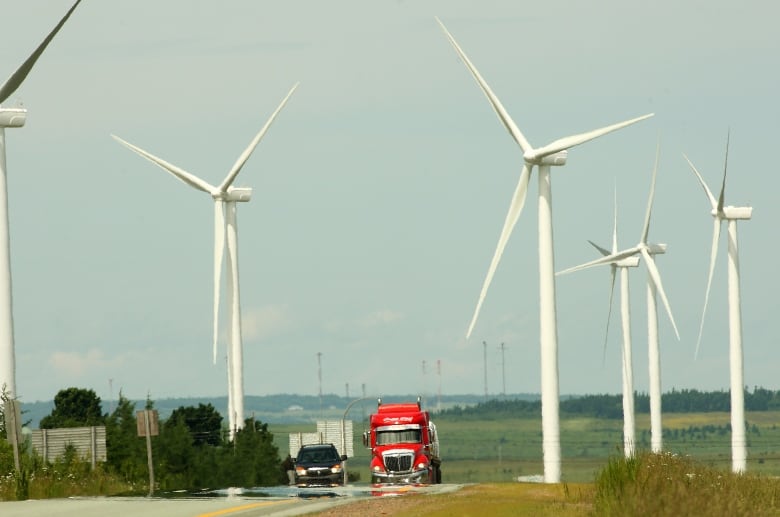Proposed wind farm could become Nova Scotia's largest
28 turbines near Windsor would generate enough electricity for 50,000 homes

A proposed wind farm in Hants County, N.S., stands to become the largest wind energy generator in the province and give a boost toward the provincial government's renewable energy targets.
Natural Forces, a Halifax-born power company, submitted its plans for the Benjamins Mills wind project to Nova Scotia's Department of Environment this week. The company is seeking approval to build up to 28 turbines about 13 kilometres southwest of the town of Windsor.
The wind farm could generate up to 150 megawatts, or, by the company's estimate, enough power for as many as 50,000 homes.
Nova Scotia is already dotted with hundreds of wind turbines, but few existing farms are on the same scale as the one Natural Forces wants to build.

The South Canoe Wind Project in Lunenburg County currently holds the title of Nova Scotia's largest, with 34 turbines and a generation capacity of 102 megawatts.
The Benjamins Mills project would have fewer turbines than South Canoe, but they would be taller, at 200 metres from ground to blade tip (that's equivalent to a 60-storey building), and generate more energy.
"Technology has come a long way with wind turbines in the last while," said Meg Morris, development manager for Natural Forces.
Land already clear cut for forestry
According to the documents filed with the province, 24 of the turbines would be installed on leased private land and four on leased Crown land — all areas that were previously forested but clear cut by industry.
In its proposal, the company suggests installing a wind farm at the chosen site would be a good use of land that's already been altered by human activity.
The area has the added benefit of elevation that would allow the turbines to capture high wind speeds, logging roads for access, nearby transmission lines for connecting to the electric grid and setbacks of at least one kilometre from any homes.

If all goes according to plan, Natural Forces wants to start construction toward the end of 2022, with the aim of having turbine blades spinning by 2024. The whole project, however, is contingent on a few things.
One factor is government approval. The project requires development permits from the West Hants Regional Municipality and environmental approval from the province.
West Hants Mayor Abraham Zebian said the company has already been consulting with the community and he was not aware of any opposition to the project.
With the environmental approval documents filed with the province, the public can now submit comments to the Environment Department until Feb. 17. The minister has a deadline of March 9 to make a decision about the proposal.
Waiting on provincial tenders
The wind farm also hinges on Natural Forces striking a deal, known as a power purchase agreement, to sell the energy it would generate. The company is hoping to secure such an agreement through one of a couple competitive bidding processes the province is expected to open this year, which will be for renewable energy, exclusively.
"We expect more opportunities in the future, as well," said Morris. "The province has set very ambitious goals for renewable energy, so to reach those goals, they'll need lots of projects."
Depending on those factors, Morris said the scale of the project could change. The company has contingency plans to size down to as few as eight turbines generating 50 megawatts.
Even if this project goes ahead at full scale, there would still be a long way to go for Nova Scotia to reach its goal of using 80 per cent renewable energy by 2030.
About 30 per cent of Nova Scotia's power comes from renewable sources. About two-thirds of that energy is wind-generated. A spokesperson for Nova Scotia Power said the utility expects to increase renewable energy use to 60 per cent this year.
Mi'kmaw ownership
While Natural Forces is the sole name attached to the project on the documents filed with the province, a Mi'kmaw company also has a stake.
The Wskijnu'k Mtmo'taqnuow Agency, a company owned jointly by Nova Scotia's 13 Mi'kmaw bands, owns a majority share of the proposed wind farm.
Natural Forces said the exact breakdown of the partnership is confidential. The company also declined to provide an estimate of the project's cost.
The Wskijnu'k Mtmo'taqnuow Agency, known as WMA, was previously attached to the proposed workforce lodge for the Goldboro natural gas plant — a project that was shelved last year.

